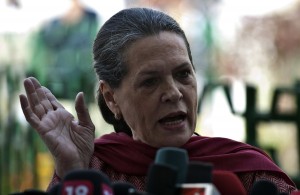By Karen Diep
Impunity Watch Reporter, Asia
NEW DELHI, India – On Tuesday, Sonia Gandhi, president of India’s ruling Congress party, denounced the increase in rape victims. Ms. Gandhi visited the home of a 16 year-old victim who had recently committed suicide.

“We will take strict action against the offenders,” promised Ms. Gandhi during her visit. “Such barbaric acts are condemnable . . . [and] rapists should be given the severest punishment.”
According to New York Daily News, Ms. Gandhi, who is considered the most powerful politician in India, travelled to the girl’s village in the Haryana state to meet the victim’s relatives and relay the government’s outrage over the surge in such crimes.
“Now I am hopeful justice will be done,” said the victim’s mother after meeting Ms. Gandhi.
Last week, the victim burned herself to death after being gang-raped by men in the Jind district just 80 miles from New Delhi. Furthermore, according to media reports, authorities have arrested five men, one of which was a police officer.
Over the last seven years, rape cases in the Haryana state have doubled. Moreover, this past September, there were 12 purported rapes, and according to BBC, most of these victims were underage Dalits (formerly known as “untouchables”).
A member of Ms. Gandhi’s party, Phool Chanda Mulana, stated, “[S]uch incidents have happened earlier.”
On September 18th, a man committed suicide by swallowing pesticides in the Hisar district after he learned that 12 men gang-raped his underage daughter. Furthermore, on October 1st, a man allegedly raped a 15 year-old Dalit girl with learning disabilities in the Rohtak district. Within the same area and just two days after, a 13-year-old girl was purportedly raped by her 45-year-old neighbor.
In response, Haryana’s police chief, Ranjiv Dalal, asked the media to “exercise restraint” while reporting these attacks. Mr. Dalal further stated that from January to August, the number of rape cases in the state had decreased to 455 rapes this year compared to 534 the same time last year.
“The nature of the crime created hype in the number of rape cases registered in Haryana,” said Hisar district’s Police Superintendent, Satish Balan. “In two cases there were suicides which led to media coverage of rapes in Haryana otherwise the number of rapes registered has come down by 15%. This is the truth.”
Four U.N. agencies urged the Indian government to give the issue urgent attention in a letter to the country’s minister for Women and Child Development.
For further information, please see:
CNN – Indian girl seeks justice after gang rape – 12 October 2012
The International News – Sonia speaks out against rape cases – 10 October 2012
BBC – Sonia Gandhi visits Haryana rape victim family – 09 October 2012
NY Daily News – India’s Sonia Gandhi speaks out over rape cases – 09 October 2012



